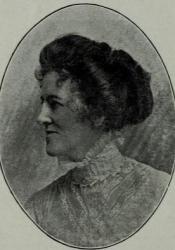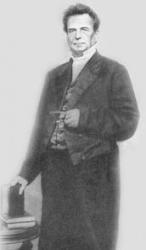Planning worship?
Check out our sister site, ZeteoSearch.org,
for 20+ additional resources related to your search.
- |
User Links
Person Results
‹ Return to hymnal




Export as CSV
W. W. Partridge
Hymnal Number: d59 Author of "Then will we rejoice and be happy in thee" in The Pearl
W. W. Partridge
M. H. Brown
Hymnal Number: d3 Author of "Abide with us, dear Savior, we feel so much alone" in The Pearl
M. H. Brown
Martha A. W. Cook
1806 - 1874 Hymnal Number: d50 Author of "Then trust in the Lord" in The Pearl Martha Elizabeth Duncan Walker Cook USA 1806-1874. Born in Northcumberland County, PA, she married Rev. Parsons Cook, editor of a Boston paper called “The Puritan Recorder”. She contributed to, and for a time, was editor of the “Continental Monthly”. She translated “The life of Chopin”, by Franz Liszt, from the French in 1863. She also translated “Undivine comedy” by Zygmund Krasinski in 1875. She died in Hoboken, NJ.
John Perry
Martha A. W. Cook
Frances L. Mace
1836 - 1899 Hymnal Number: d90 Author of "Only waiting till the shadows" in The Pearl Mace, Frances P., née Laughton, was born in Orono, Maine, Jan. 15, 1836, and married in 1855 to Benjamin H. Mace, a Lawyer of Bangor. Her hymn "Only waiting till the shadows" (Heaven Anticipated), was written in 1854, and printed in a local newspaper, the Waterville Mail (Maine), Sep. 7, 1854, in 4 stanzas of 8 lines. It has attained a wide circulation in Great Britain and America. Full text in I. D. Sankey's Sacred Songs & Solos, 1878. See Woman in Sacred Song, 1885, p. 139, for counter-claim on behalf of Mrs. F. A. F. Wood-White.
--John Julian, Dictionary of Hymnology, Appendix, Part II (1907)
==================
Born: January 15, 1834, Orono, Maine.
Died: July 20, 1899.
Buried: Los Gatos Memorial Park, San Jose, California.
In 1837, Frances’ family moved to Foxcroft (now Dover-Foxcroft), Maine, where she grew up. By age 10, she was studying Latin, and had verses published by age 12. The family later moved to Bangor, Maine, where she graduated from high school, and studied German and music with private teachers. In 1855, she married lawyer Benjamin F. Mace of Bangor; in 1885, they moved to San Jose, California. They had eight children, four of whom reached adulthood. Her works include:
Legends, Lyrics and Sonnets, 1883
Under Pine and Palm, 1888
Sources:
Willard, pp. 482-83
http://www.hymntime.com/tch/bio/m/a/c/mace_fl.htm
Frances L. Mace
Mary E. Kail

1828 - 1890 Hymnal Number: d136 Author of "There I shall wear a golden crown" in The Pearl Mary Elizabeth Harper Kail, Circa 1828-1890
Born: 1827 or 1828, Washington, DC.
Died: January 28, 1890, Washington, DC, or Ohio.
Daughter of Andrew Harper and Mary McDermott-Roe (daughter of Cornelius McDermott-Roe, a laborer who worked for George Washington). Mary’s father died young, possibly of malaria, while Mary and her sister Virginia were children. Mary and Virginia moved together to Carroll County, Ohio, and in 1843 Mary married Gabriel Kail (1814-88). By 1878, Mary was editor of the Connotton Valley Times in Carroll County. In the late 1880s, Mary was a clerk for the United States Treasury Department; she lost that job in September 1885 due to a change in administration. Her works include:
Crown Our Heroes, and Other Poems, 1887
--www.hymntime.com/tch/
Mary E. Kail
J. D. Vinton
1831 - 1903 Hymnal Number: d73 Author of "My longing soul would fly" in The Pearl
J. D. Vinton
William Bourn Oliver Peabody

1799 - 1847 Person Name: William B. O. Peabody Hymnal Number: d9 Author of "Behold the western evening light" in The Pearl Peabody, William Bourne Oliver, D.D., twin brother of Oliver William Bourne, was born at Exeter, New Hampshire, July 9, 1799, and educated in his native town and at Harvard College. Leaving Harvard in 1817, he taught for a year at an academy in Exeter, and then proceeded to study theology at the Cambridge Divinity School. He began to preach in 1819, and became the Pastor of the Unitarian Congregation at Springfield, Massachusetts, in October, 1820. This charge he held to his death on May 28, 1847. His Memoir (written by his brother) was published with the 2nd ed. of his Sermons, 1849; and his Literary Remains followed in 1850. "He was a man of rare accomplishments, and consummate virtue," whose loveliness of character impressed many outside his own sect. In 1823 he published a Poetical Catechism for the Young to which were appended some original hymns. He also edited The Springfield Collection of Hymns for Sacred Worship, Springfield, 1835. A few of his hymns also appeared in that collection. His hymns in common use are:—
1. Behold the western evening light. Death of the Righteous, or Autumn Evening. Published in his Catechism, 1823, in 6 st. of 4 1., and again in his Springfield Collection, 1835, No. 484. It is in common use in its original form; also as altered in the Leeds Hymn Book, 1853; and again as altered by George Rawson in the Baptist Psalsm & Hymns, 1858, where it reads "How softly on the western hills."
2. God of the earth's extended plains. Hymn of Nature. This is in Griswold's Poets and Poetry of America, in 6 st. of 8 1. This is thought by some to be the production of his brother Oliver; but Putnam assigns it to William. It is given abbrevi¬ated in a few collections. The hymn "God of the rolling orbs above," in the Boston Unitarian Hymns [and Tune"] Book, 1868, and others, begins with st. v.
3. 0 when the hours of life are past. The Hereafter. This hymn, in 6 st. of 4 1., was given in his Catechism, 1823, as the Answer to "Question xiv. What do you learn of the Future State of Happiness." It is in use in its original form, and also altered as "When all the hours of life are past."
4. The moon is up: how calm and slow. Evening. A poem rather than a hymn, in 6 st. of 4 1., appended to his Catechism, 1823.
5. When brighter suns and milder skies. Spring. Appended to his Catechism, 1823, in 6 st. of 4 1.
The full texts of all these hymns are in Putnam's Singers and Songs of the Liberal Faith, Boston, U. S. A., 1875. [Rev. F. M. Bird, M.A.]
-- John Julian, Dictionary of Hymnology (1907)
William Bourn Oliver Peabody
Georgia T. Snead

Hymnal Number: d27 Author of "O lead me, Father" in The Pearl Georgia Tillman Snead was orn in Virginia. She wrote several volumes of prose and a book of poems.
Dianne Shapiro, from "The Singers and Their Songs: sketches of living gospel hymn writers" by Charles Hutchinson Gabriel (Chicago: The Rodeheaver Company, 1916)
Georgia T. Snead
Nathaniel Colver

1794 - 1870 Hymnal Number: d71 Author of "My God, I wait for Thee" in The Pearl Colver, Nathaniel, D.D., an eminent preacher and abolitionist, born at Orwell, Vermont, 1794, and entered the Baptist Ministry in 1836, becoming successively Pastor at Boston, Detroit, Cincinnati, and Chicago. After the war, in 1865, he founded the Colver Institute at Richmond, Virginia. He died Sept. 25, 1870. In 1848 he contributed 17 hymns to Banvard's Christian Melodist, Boston, U.S; Of these the best known are:—“Come, Lord, in mercy come again," Lent; and " Weep for the lost! thy Saviour wept" (Sympathy), as in the Baptist Praise Book, N. Y., 1871, &c. [Rev. F. M. Bird, M.A.]
--John Julian, Dictionary of Hymnology (1907)
=============================
Colver, Nathaniel. (Orwell, Vermont, May 10, 1794--September 25, 1870), Chicago, Illinois). Baptist. Granville College (Denison University) D.D. 1856. Pastorates at West Clarendon, Vermont, 1819-1821; Fort Covington, New York; Kingsbury, New York; Fort Ann, New York; Union Village, New York, 1834-1838; Holmesburgh, Pennsylvania, 1834; Tremont Temple, Boston, 1839-1852; South Abington, Massachusetts, 1852-1853; Detroit, Michigan, 1853-1856; Cincinnati, Ohio, 1856-1861; Chicago, Illinois, 1861. In 1865, he founded the Colver Institute, which survives in the theology department of Virginia Union University at Richmond, Virginia; became president of the Freedman's Institute, Richmond, Virginia, 1867-1870. He was a founder of the Divinity School of the University of Chicago. He was very active in anti-masonic, anti-slavery, and temperance movements. He authored the hymn "While the earth is clad in darkness," which was the first hymn sung at his installation in Boston, September 15, 1839. He also wrote "Great God, before thy revered name, Within these ransomed walls we bow," which was sung at the dedication of Tremont Temple (formerly Tremont Theatre) on December 7, 1843. He is the author of the Lenten hymn, "Come, Lord, in mercy come again, with thy converting power," which, along with sixteen other of his hymns, appeared in the Christian Melodist which was compiled by Joseph Banvard in 1848. He contributed five hymns to Ocean Melodies (1849), a collection of hymns compiled by Phineas Stowe for seamen. He also wrote the hymn "Weep for the lost! thy Savior wept O'er Salem's hapless doom" which appeared in the Baptist Praise Book in 1871. See J. A. Smith, Memoir of Rev. Nathaniel Colver, D.D. (1873).
--Scotty Wayne Gray, DNAH Archives
Nathaniel Colver


 My Starred Hymns
My Starred Hymns


